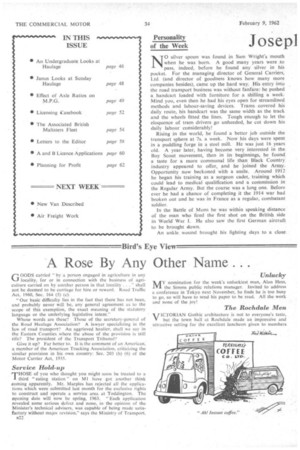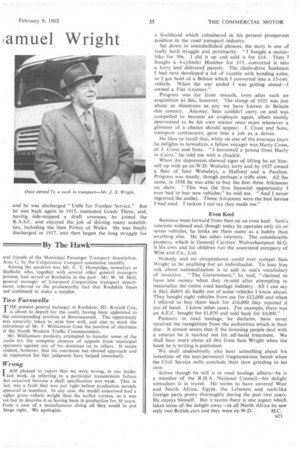Personality of the Week
Page 30

Page 31

If you've noticed an error in this article please click here to report it so we can fix it.
Josepl
pamuel Wright
NO silver spoon was found in Sam Wright's mouth when he was born. A good many years were to pass, indeed, before he found any silver in his pocket. For the managing director of General Carriers, Ltd. (and director of goodness knows how many more companies besides), came up the hard way. His entry into the road transport business was without fanfare: he pushed a handcart loaded with furniture for a shilling a week. Mind you, even then he had his eyes open for streamlined methods and labour-saving devices. Trams covered his daily route, his handcart was the same width as the track and the wheels fitted the lines. Tough enough to let the eloquence of tram drivers go unheeded, he cut down his daily labour considerably!
Rising in the world, he found a better job outside the transport sphere at 7s. a week. Now his days were spent in a puddling forge in a steel mill. He was just 16 years old. A year later, having become very interested in the Boy Scout movement, then in its beginnings, he found a taste for a more communal life than Black Country industry appeared to offer,. and he joined the Army. Opportunity now beckoned with a smile. Around 1912 he began his training as a surgeon cadet, training which could lead to medical qualification and a commission in the Regular Army. But the course was a long one. Before ever he had a chance of completing it the 1914 war had broken out and he was in France as a regular, combatant soldier.
In the Battle of Mons he was within speaking distance of the man who fired the first shot on the British side in World War I. He also saw the first German aircraft to be brought down.
An ankle wound brought his fighting days to a close and he was discharged "Unfit for Further Service." But he was back again in 1915, reattested Grade Three, and, having side-stepped a draft overseas, he joined the R.A.S.C. and enjoyed the job of driving many notabilities, including the then Prince of Wales. He was finally discharged in 1917, and then began the long struggle for a livelihood which culminated in his present prosperous position in the road transport industry.
Set down in unembellished phrases, the story is one of really hard struggle and pertinacity. "I bought a motorbike for 50s. 1 did it up and sold it for £14. Then bought a 4-cylinder Humber for £15, converted it into a lorry and delivered parcels. The chain-drive Sunbeam I had next developed a lot of trouble with bending axles, so I got hold of a Belsize which I converted into a 15-cwt. vehicle. When the war ended I was getting ahead—I owned a Fiat 4-tonner."
Progress was far from smooth, even after such an acquisition as this, however. The slump of 1921 was just about as disastrous as any we have known in Britain this century. Anyway, Sam couldn't carry on and was compelled to become an employee again, albeit sternly determined to be his own master once more whenever a glimmer of a chance should appear. J. Cross and Sons, transport contractors, gave him a job as a driver.
He likes to recall that, while on one of the overseas tours he delights in nowadays, a fellow voyager was Harry Cross, of J. Cross and Sons. "I borrowed a pound from Harry in Cairo." he told me with a chuckle.
When the depression showed signs of lifting he set himself up with an ex-W.D. Wolseley lorry and by 1927 owned a fleet of four Wolseleys, a Halford and a Peerless. Progress was steady, though perhaps a trifle slow. All the same, in 1938 he was able to buy the first three Atkinsons on show. "This was the first financial opportunity I ever had to buy new vehicles," he told me. "And I never regretted the outlay. Those Atkinsons were the best lorries I had used. I reckon I can say they made me."
Even Keel Business went forward from then on an even keel. Sam's interests widened and, though today he operates only six or seven vehicles, he looks on them more as a hobby than anything else. He has other interests. The considerable property which is General Carriers' Wolverhampton H.Q. is his own and his children run the associated company of Wise and Co., Ltd.
Nobody and no circumstance could ever compel Sam Wright to be anything but an individualist. To hear him talk about nationalization is to add to one's vocabulary of invective. "The Government," he said, "claimed to have lost money when they re-sold after attempting to nationalize the entire road haulage industry. All I can say is they didn't do badly out of some vehicles I know about. They bought eight vehicles from me for £12,000 and when 1 offered to buy them back for £16,000 they rejected it out of hand. I know other cases. For example, there was an A.EC, bought for £1,870 and sold back for £4,000."
Pioneers in road haulage, he declares, have never received the recognition from the authorities which is their due. It almost seems that if the licensing people deal with a veteran he is marked out for off-hand treatment. We shall hear more about all this from Sam Wright when the book he is writing is published.
We shall undoubtedly also hear something about his invention of the anti-personnel fragmentation bomb when the Civil Service mills conclude their slow grinding in his case.
Active though he still is in road haulage affairs—he is a member of the R.H.A. National Council—his delight nowadays is in travel. He seems to have covered West and North Africa, Egypt, the Lebanon and such-like foreign parts pretty thoroughly during the past two years. He enjoys himself. But it seems there is one aspect which takes some of the delight away—in all North Africa he saw only two British cars and they were ex-W.D. H.C.
















































































































